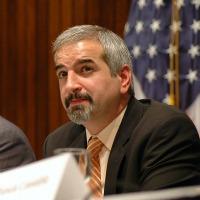BROOKE GLADSTONE:
Anthony Shadid, foreign correspondent for The New York Times, died Thursday - apparently of an asthma attack. He was reporting from Syria where he'd slipped over the border. I spoke with him last year just after he and three of his colleagues were released, after having been captured and abused by the forces of Muammar Gaddafi in Libya. I asked him what went through his mind when he was captured.
[CLIP FROM APRIL 2011 INTERVIEW]:
ANTHONY SHADID:
When we were taken, our, our biggest concern was that we'd be forgotten. You know…we were four people, and a conflict is raging around you that involves millions. We were obviously very lucky and treated much better than we probably could have been. But I think, selfishly, when you're in that situation, you do hope that you're not going to be forgotten.
[END CLIP]
BROOKE GLADSTONE:
In 2002 he was shot in the West Bank. That Shadid put himself in danger goes without saying, but he did so to tell us stories about people so often in conflict we might overlook them.
[MUSIC UP AND UNDER]
ANTHONY SHADID:
You know, we don't leave the story just because, you know, people aren't interested in the story. You know, I think a lot of journalists will feel that it's almost a mission to cover these stories when no one —cares about them.
BROOKE GLADSTONE:
Anthony Shadid was one of the best. It's a great loss.
